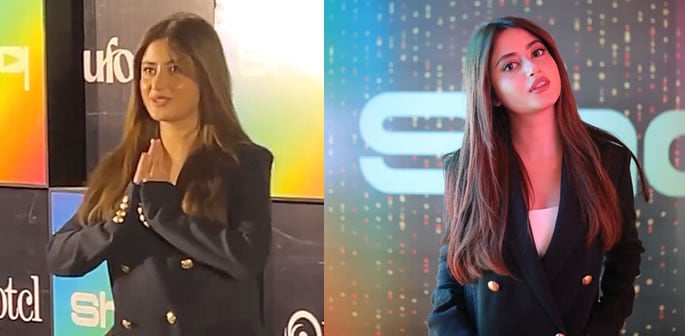Sajal Aly faces backlash for ‘Namaste’ Gesture

Sajal Aly was subjected to criticism after she appeared to make the Namaste gesture.
The actress attended the launch event of the new Pakistani streaming platform Shoq with her sister Saboor Aly.
Whilst posing on the red carpet for the paparazzi, Sajal folded her hands several times. Saboor was also seen folding her hands.
Footage of the matter went viral and many social media users criticised the actress for appearing to perform the Namaste gesture, a Hindu custom.
One user asked: “Is she Hindu?”
Another said: “Why do they do namaste?
“Don’t they have any gesture of their own? When will they realise that following others doesn’t make them stand out?”
One user believed Sajal had forgotten her Pakistani roots, writing:
“This girl has changed her colours by doing a film with Sridevi of India. She is flying high, she is thinking that she is a supporter with folded hands.”
One comment read: “Sooooo cheap what’s wrong with these sisters.”
Another stated: “Absolutely atrocious.”
But some came to Sajal’s defence, explaining that she folded her hands to say thank you.
One said: “Relax guys some people do this gesture as a form of thank you… It does not mean ‘namaste’.”
Another said: “She said thank you.”
But one person was not convinced, saying Sajal could have performed another gesture to say thank you. The user wrote:
“Why folding hands, it can be any other gesture if she wants to thank anybody.”
Despite the criticism, Sajal Aly has been at numerous events.
She has also been promoting her upcoming British romantic film What’s Love Got to Do with It?
The film is set to release on February 24, 2023.
At the International Red Sea Film Festival, director Shekhar Kapur praised Sajal. While introducing her to the audience, Shekhar said:
“Do you know when you first came on the screen at the first showing, every man in the hall gasped!
“She’s one of Pakistan’s greatest actresses and she’s brilliant. Thank you very much, Sajal.”
Sajal is also set to lead a series adaptation of the Urdu novel Umrao Jaan Ada.
The novel was written by Mirza Hadi Ruswa in 1899 and it is known for its portrayal of the culture and society of the 19th-century Indian subcontinent, particularly the lives of courtesans.
Hamid Hussain, who is co-producing the series with Muhammad Yaqoob, said the series adaptation relies “heavily on the original Urdu version of the novel, unlike the film adaptations that had taken creative liberties to fit the story into a film narrative”.
He told Variety: “There is a lot in the novel that has never been shown in an audiovisual project.”